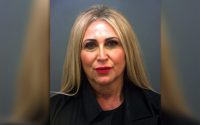From segregated schools to the bench
Few watching the six-week trial of convicted doubler murderer Alex Murdaugh were unmoved by the extraordinary and highly personal 15-minute admonishment that presiding Judge Clifton B. Newman gave the once prominent lawyer before sentencing him to life in prison Friday.
For many South Carolina residents, the optics of watching Newman, 71, who is African American and grew up going to the state’s segregated schools, rule with such finality over the fate of the scion of one of the most powerful legal families in the state was astonishing.
So were the sometimes scathing but also heartfelt words Newman spoke to Murdaugh, often sounding more like a pastor than a judge.
“Judge Newman took me to church!” said one longtime observer of the trial who lives in Charleston.
Newman lost his son, Brian, 40, a former Columbia, SC, city councilman, in January, reportedly from a cardiac issue, just weeks before the Murdaugh trial.
Newman suggested Murdaugh had a “monster” inside him and remarked that he must be “visited” by the ghosts of his wife, Maggie, and son Paul, every night.
Murdaugh, 54, was convicted of slaughtering his family with a shotgun and an AR-15 rifle at the dog kennels at the Murdaugh hunting lodge in Islandton, SC, on June 7, 2021.

“But within your own soul, you have to deal with that,” Newman said. “And I know you have to see Paul and Maggie during the nighttime when you’re attempting to go to sleep. I’m sure they come and visit you, I’m sure.”
Murdaugh replied: “All day and every night.”
“I’m sure,” Newman said. “And they will continue to do so. And reflect on the last time they looked you in the eyes, as you looked the jury in the eyes.”

‘The best that we want in our jurists’
Newman grew up in rural Williamsburg County, about 80 miles northwest of Charleston and was the first person in his family born in a hospital, the Post and Courier reported.
He left for college at Cleveland State University in Ohio in 1969, having never attended school with a white person in his life. He later went to law school, moved his family back to South Carolina and ultimately became a judge who knew Alex Murdaugh and his family as lawyers.
The Colleton County courthouse in Walterboro, SC, where the Murdaugh trial took place is fronted by a huge Confederate memorial out front. It was also once one of the bases for the notorious, pro-slavery “Fire-eaters” like Robert Barnwell Rhett, a one-time US Senator from the state who gave thundering speeches in the 1830s, ’40s and ’50s in favor of secession and slaveholder rights — and were credited in part for spurring on what became the Civil War.


“A people, owning slaves, are mad, or worse than mad, who do not hold their destinies in their own hands,” Rhett said in one of his early orations.
Linda Bryan, 61, who grew up in Hampton County and knew the Murdaugh family, told The Post it was a very different environment for black people when both she and Newman were growing up.
“The Murdaughs put both white and black people in jail and the blacks usually got more time than white people,” Bryan recalled. “But the Murdaughs were so powerful, there wasn’t much anyone could do. It was incredible to see Judge Newman up there taking care of business so the Murdaughs won’t be able to continue with their corruption.”
Race relations at that time in the area were bad, she said.

“I was called a half-breed and a house n—-r,” Bryan, now an evangelist in Hilton Head, SC, told The Post. “My daddy would take me to this restaurant in town to buy food, and we had to go around the back. When I asked him why, he said that’s where the black folks had to go.”
Bryan attended Fennell Elementary School in Yemassee, SC, and she clearly remembers a white teacher there who would wear a white coat to school and put her hand in her pocket to open the front door — every day.
The teacher would also take out a tissue every time she had to use the same pencil sharpener her black students did.
“The assumption was she did all that so she wouldn’t have to touch what we touched,” Bryan said. “That’s how it was for people like me and Judge Newman.”
“Judge Newman represents the best that we want in our jurists,” Eric Bland, a prominent Columbia SC attorney who represents the sons of Murdaugh’s dead housekeeper, Gloria Satterfield, as well as other Murdaugh victims, told The Post Saturday.

“He has a reserved, even temperament and has a quiet, heroic commanding presence. He is no (O.J. Simpson Judge) Lance Ito nor is he like the judge in the Anna Nicole Smith case. He lets the lawyers present their cases and he keeps control of his courtroom.”
Dick Harpootlian, one of Alex Murdaugh’s two defense lawyers, was less glowing when asked about Newman on Saturday. Harpootlian has said he plans a vigorous appeal in Murdaugh’s case.
“In general, he’s a good judge,” Harpootlian told The Post. “But I think he made some errors in judgment in this case.”

Harpootlian said it was incorrect of the judge to allow testimony about the 99 financial crimes Murdaugh is charged with because he believes it unfairly influenced the jury’s view of Murdaugh as a person.
“The prosecutors said they needed to include the financial crimes to show motive but at the end (prosecutor John Meadors) told the jury they didn’t have to prove motive. We argued against it, and I think it will prove crucial during the appeal.”


